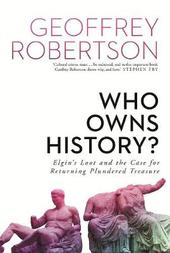
|
Who Owns History?: Elgin's Loot and the Case for Returning Plundered Treasure
Hardback
Main Details
| Title |
Who Owns History?: Elgin's Loot and the Case for Returning Plundered Treasure
|
| Authors and Contributors |
By (author) Geoffrey Robertson
|
| Physical Properties |
| Format:Hardback | | Pages:304 | | Dimensions(mm): Height 240,Width 163 |
|
| Category/Genre | Art History
History |
|---|
| ISBN/Barcode |
9781760893699
|
| Audience | |
|---|
|
Publishing Details |
| Publisher |
Penguin Random House Australia
|
| Imprint |
Penguin Random House Australia
|
| Publication Date |
5 November 2019 |
| Publication Country |
Australia
|
Description
Geoffrey Robertson focuses his razor-sharp mind on one of the greatest contemporary issues in the worlds of art and culture- the return of cultural property taken from its country of creation. 'This is a powerful cry for justice - it deserves a response.' Amal Clooney Hard on the heels of his best-selling autobiography Rather His Own Man, Geoffrey Robertson, one of Australia's foremost public intellectuals, turns his mind to a vital contemporary question that divides the world of art and culture- the restitution of heritage treasures removed in earlier times from subjugated peoples who now want them back. Taking his cue from Cicero, the great Roman barrister, Geoffrey Robertson argues that justice requires the return not only of the 'Elgin' Marbles to Greece, but of many looted antiquities on display in the museums of Britain, Europe and America. He argues that the Gweagal Shield - dropped when James Cook shot at two men from the Gweagal clan in Botany Bay in 1770 - should be returned to Australia from the British Museum. He wants the government to acquire the hull of HMS Endeavour recently located off Rhode Island. He has located Arthur Phillip's tombstone for Yemmerrawanne, the first Australian expatriate, in a South London churchyard, and he wants to bring it back. Robertson's judgement is uncompromising- cultural heritage belongs to the people of whose history it is a part, unless its return would be attended by danger to the artwork itself. And since the movement for the restitution of cultural property is based on human rights, governments that want it back must show respect for the rights of the peoples on whose behalf they make the claim. Who Owns History? not only delves into the crucial debate over the Marbles, but examines how the past can be experienced by everyone, as well as by the people of the country of origin.
Author Biography
Geoffrey Robertson QC has had a distinguished career as a trial counsel and human rights advocate. He has been a UN war crimes judge, a counsel in many notable Old Bailey trials, has defended hundreds of men facing death sentences in the Caribbean, and has won landmark rulings on civil liberty from the highest courts in Britain, Europe and the Commonwealth. He is founder and head of Doughty Street Chambers, a Master of the Middle Temple, and a visiting professor at the New College of Humanities in London. His book Crimes Against Humanity has been an inspiration for the global justice movement, his other books include Freedom, the Individual and the Law, The Tyrannicide Brief, The Statute of Liberty, Dreaming Too Loud and the acclaimed memoir The Justice Game. He has made many television and radio programmes, notably Geoffrey Robertson's Hypotheticals, and has won a Freedom of Information award for his writing and broadcasting. In 2011 he received the New York State Bar Association's Award for 'Distinction in International Law and Affairs', and was Australian Humanitarian of the Year in 2014. In 2018 he was awarded an order of Australia (AO) for 'his distinguished service to the law and the legal profession as an international human rights lawyer and advocate for global civil liberties'.
|